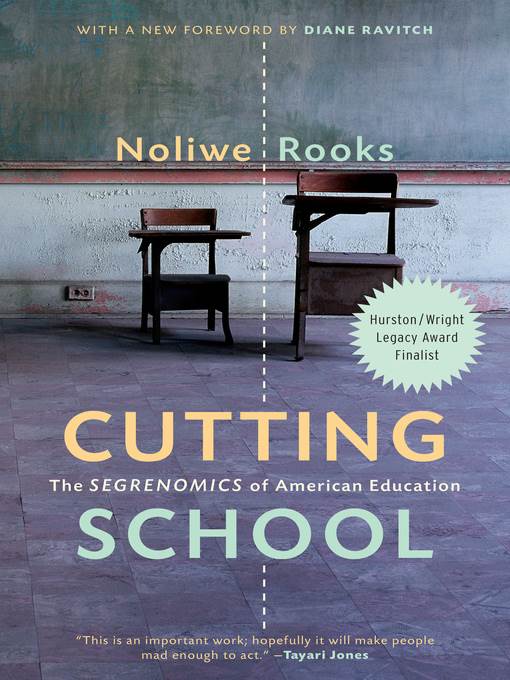
Cutting School
The Segrenomics of American Education
کتاب های مرتبط
- اطلاعات
- نقد و بررسی
- دیدگاه کاربران
نقد و بررسی

July 15, 2017
An exploration of how minority and poor children continue to be the victims of pernicious educational reforms.Weighing in on the charged topic of public education, Rooks (American Studies/Cornell Univ.; White Money/Black Power: The Surprising History of African American Studies and the Crisis of Race in Higher Education, 2006, etc.) mounts a blistering and persuasive argument against school reforms that she sees as detrimental to disadvantaged students. Charter schools and their management organizations, vouchers, virtual schools, and "an alternatively certified, non-unionized teaching force" are basically capitalist ventures that enforce segregation. She calls the reform efforts "segrenomics": business strategies that prey on powerless communities and do not account for the necessary voices of parents, teachers, or students. Rooks is equally critical of the past four presidents, whose proposals, despite their optimistic titles, failed to alleviate dysfunction. She traces the movement for privatization to the 1990s, when the Edison Project, an independent for-profit chain of schools, persuaded state and city governments that its schools could "break the mold of traditional education and outperform public schools." Reaping tax dollars and corporate investment, the Edison Project never achieved "the promised profits or test score gains." Yet despite its failure, it spawned a growing charter school industry, most recently touted by Secretary of Education Betsy DeVos. Rooks opposes vouchers, an idea promoted by economist Milton Friedman, "who wanted to dismantle public education." Indeed, in communities that instituted vouchers, white families often used them to keep their children in predominantly white schools, and black schools deteriorated. The quest to educate disadvantaged students as cheaply as possible has led to an increased focus on virtual schools, which minimize the costs of buildings, teachers, and staff. In Philadelphia, students in more than a dozen cyberschools failed state achievement tests. Offering a strong counterargument to charter school advocates such as David Osborne, Rooks proposes no easy answers: "our system," she writes, "will need to be almost completely overhauled and rethought." A convincing argument that the only viable, proven school reform strategy is integration, a solution distressingly difficult to achieve.
COPYRIGHT(2017) Kirkus Reviews, ALL RIGHTS RESERVED.

Starred review from August 7, 2017
Illustrating the ways that segregation, poverty, and race intertwine to affect America’s education landscape, Rooks (White Money/Black Power) clearly and vigorously maps the systemic disadvantages imposed upon students of color and the poor. “The infrastructure, ideology, progress, and promises all fall more than a little short if the goal is equality,” Rooks argues. While the performance gap between students from poor schools and wealthy schools is widely reported, Rooks shows how reform efforts have “focused far less on the structure or system itself and more on the failures of those it is designed to educate.” By closely examining these federally supported and increasingly privatized initiatives over the past 30 years, Rooks finds both a growing racial divide in education and an increasingly lucrative sector of business. She introduces the term segrenomics, which she defines as “the business of profiting from high levels of racial and economic segregation.” Pointing to the financial success of organizations such as Teach for America (valued at $400 million dollars in 2016), Rooks questions who actually benefits from charter schools, voucher programs, and virtual schooling. She argues that reform must integrate those who are most often excluded from the process: teachers and members of disenfranchised communities themselves. Poignant and plainly stated, Rooks’s thorough narrative of socioeconomics urges greater criticism and thoughtfulness about education reform in the 21st century. Agency: Diana Finch Literary Agency.

























دیدگاه کاربران